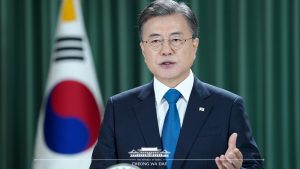Joining other leaders from around the world in delivering virtual remarks to the 75th United Nations General Assembly (UNGA) on Tuesday, South Korean President Moon Jae-in emphasized the importance of international cooperation to overcome the COVID-19 crisis and in reaching a peace agreement on the Korean Peninsula.
Whereas diplomacy with North Korea was the core focus of Moon’s previous UNGA speeches, COVID-19 understandably took center stage this year. Moon talked about South Korea’s approach to the virus both at home and abroad, sharing lessons learned that he encouraged others to follow. In Moon’s word:
The Republic of Korea took key values of democracy and turned them into 3 main principles of infectious disease prevention: openness, transparency, and democracy…Korea also combined multilateralism with its community spirit, enabling people to practice the spirt of freedom for all… By sharing infectious disease equipment with other countries without closing borders, Korea is keeping our country and economy intact.
While these points echo those Seoul has been pushing throughout the year, they are made all the more salient by the challenges of “vaccine nationalism,” which is threatening to prevent possible COVID-19 vaccines from being distributed around the world. Both the United States and China have opted not to join the COVAX Facility, designed to fairly coordinate the purchase and distribution of COVID-19 vaccines among participating countries. As Beijing and Washington are backing some of the most promising vaccine candidates, their lack of support for COVAX could ultimately hinder its important role. This is not lost on Moon, who stated the first test for the U.N.’s goal of “inclusiveness in multilateralism is whether the U.N. can distribute COVID vaccines to all nations.”
In combatting the economic effects of the virus, Moon also highlighted South Korea’s New Deal, featuring both digital and green components. The Blue House’s efforts to infuse fiscal stimulus with climate priorities in the face of the coronavirus has won praise from U.N. Secretary General Antonio Guterres, but the government has a long way to go in meeting its lofty objectives. Still, Moon offered South Korea’s help to developing countries in shaping their own climate strategies given South Korea’s own past experience with rapid economic development.
Of course, North Korea still featured prominently in Moon’s remarks this year. He admitted “peace on the Korean Peninsula is still in the making and changes that used to be brimming with hopes have stalled,” but also underscored South Korea’s continued commitment to peace through dialogue. Prefaced by a call for a more robust multilateral architecture to face non-traditional security threats, Moon’s most consequential statement on North Korea was the proposed launch of a Northeast Asia Cooperation Initiative for Infectious Disease Control and Public Health. The institution would provide a formal means for the two Koreas – alongside Japan and Mongolia – to cooperate on public health issues. Though he did not elaborate on the details of the organization, Pyongyang’s refusal of assistance from Seoul in handling the virus so far does not bode well for the organization’s ultimate objective of improved inter-Korean relations.
Moon also repeated calls for a formal end of war declaration with Pyongyang. Though critics have claimed this would not necessarily lead to any tangible changes in North Korea’s military posture or that it could even challenge the foundations of the U.S.-South Korea alliance, Moon reiterated an “end of war declaration will open the door for complete denuclearization and a permanent peace regime on the Korean Peninsula.”
The hopefulness for multilateralism imbued throughout the speech is probably best summarized near the end of his remarks with the line: “Humanity will in the end head into an era of solidarity and cooperation.” Yet this stands in sharp contrast to U.S. President Donald Trump’s speech earlier in the day
Trump’s remarks read almost as they were deliberately written to conflict with Moon’s. While Moon stressed the need to help your neighbors to best help yourself, Trump argued that “only when you take care of your own citizens will you find a true basis for cooperation.” Trump also was much more punitive when he stated “we must hold accountable the nation which unleashed this plague onto the world: China.”
Comparing these two speeches highlights the broader challenges South Korea faces on the global stage. Though Moon laid out an ambitious agenda for international cooperation, it can only be effective to the extent that other partners are willing to adhere to similar principles. Moon’s message seems to be falling on deaf ears in the United States — at least for now. Still, international cooperation presents the best path forward for South Korea and promoting diplomacy remains vital to its national interests, no matter how Sisyphean it may seem at times.

































